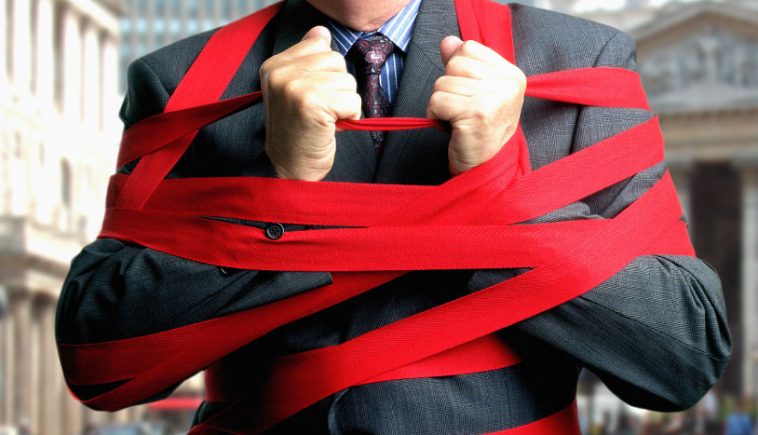 See original article here…
See original article here…
Would you trust government more than business to keep you safe? Amazingly, most people say ‘yes’ almost automatically when asked. They see government as the trusted nanny that has their best interests at heart. Business firms, on the other hand, are viewed as unscrupulous profit seekers that would not hesitate to compromise their customers’ and employees’ health and safety just to make another buck. Business can only be held in check by government regulation. But is this really true? I argue ‘no’.
Despite government inspection of food or regulation of pharmaceuticals, for example, food poisonings and salmonella contamination still happen, and drugs with harmful side effects still make it to market. Government-licensed health care providers, day care operators, and taxi drivers still make mistakes, which negatively impacts their clients and customers.
Even if government regulators and inspectors truly care about people’s health and safety (which one would hope they do), they are human: fallible and prone to make mistakes. And as government employees, their incentives to avoid mistakes are limited: if they commit a really grievous error, their re-election or jobs may be at risk, but there is no threat of losing business or profits.
For business firms (their owners, managers, and employees), on the other hand, the consequences of harming their customers, employees, or others, are severe. They may lose their business and their freedom, such as Sohel Rana, the owner of the collapsed factory building in Bangladesh, who is in prison awaiting for trial, charged with murder of the over 1,200 workers who died. Or their profits, reputation, and brand value may be severely damaged, like Volkswagen’s after it cheated in emissions control tests of its “clean” diesel cars. Or they lose everything and live in mental anguish, imprisoned, for the rest of their lives, such as Bernie Madoff (although his pyramid investment scheme hardly qualified as a business).
So which is more effective in keeping us—as customers and employees—safe: the government bureaucrat with no (or minimal) personal incentive, or the businessman, whose profits and reputation depend on the safety and satisfaction of his employees and customers?
I argue the latter, because it is the businesspeople who have a lot more at stake when their conduct or negligence causes harm to others. However, there are two conditions required for aligning the interests of business and of their customers, employees, and others: free markets and protection of individual rights by government—in other words, a capitalist system we currently don’t have.
First, there must be competition—free markets without government regulation and protectionism—to compel companies to attract the best employees possible (with safe work places, good pay, and interesting work) and to provide the best (highest quality and lowest priced) products and services to customers. Government interference in the markets removes or dilutes such incentives.
Second, instead of imposing costly regulations that delay or prevent life-enhancing products and services from reaching the market (such as pharmaceuticals), government must protect the individual rights of its citizens against the initiation of physical force and fraud. This should be the only role of government, and it would be sufficient to deter and prosecute any violation of rights by business and others.
The now-defunct Peanut Corporation of America knowingly shipped salmonella-contaminated peanut butter, causing the deaths of several people and illness of hundreds, regardless of government regulations and inspections. Recently, grated parmesan cheese adulterated with wood cellulose was found at several U.S. supermarkets, despite government regulations and inspections. There are countless other examples of the ineffectiveness of government regulations in keeping us safe.
If the government, instead of wasting taxpayers’ money on costly, needless regulations, performed its proper role in protecting individual rights and imposed severe sanctions for their violation through the court system, there would be much stronger deterrent to businesses than what any regulation can provide. And we would be much safer.
We don’t need the government to regulate business because it is in the interest of business to regulate itself. Particularly in industries where the products and services are critical to our health and well-being, such as pharmaceuticals, health care, food, and automobiles, companies may want to work together to form independent testing or certification organizations.
If we want safer, better workplaces and safer, better products and services, we should ask for less government regulation, not more, and advocate capitalism: freedom and protection of individual rights.
Photo credit: Max Pixel
Originally posted February 29, 2016 Jaana Woiceshyn teaches business ethics and competitive strategy at the Haskayne School of Business, University of Calgary, Canada. She has lectured and conducted seminars on business ethics to undergraduate, MBA and Executive MBA students, and to various corporate audiences for over 20 years both in Canada and abroad. Before earning her Ph.D. from the Wharton School of Business, University of Pennsylvania, she helped turn around a small business in Finland and worked for a consulting firm in Canada. Jaana’s research on technological change and innovation, value creation by business, executive decision-making, and business ethics has been published in various academic and professional journals and books. “How to Be Profitable and Moral” is her first solo-authored book. Visit Dr. Woiceshyn’s archive here…
Related


